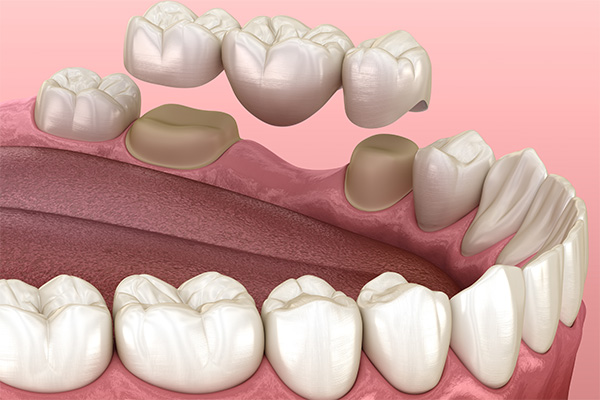Options for Replacing Missing Teeth: An Overview of Dental Bridges
 A dental bridge is an option for replacing missing teeth that creates a literal bridge from one remaining permanent tooth to the next. Traditionally, these bridges consist of a false tooth, or pontic, connected to a crown placed upon adjacent teeth on either side, although similar, but modified types of bridges do exist.
A dental bridge is an option for replacing missing teeth that creates a literal bridge from one remaining permanent tooth to the next. Traditionally, these bridges consist of a false tooth, or pontic, connected to a crown placed upon adjacent teeth on either side, although similar, but modified types of bridges do exist.
Types of dental bridges available
There are multiple types of dental bridges available, each having its benefits and disadvantages. It is best to speak with a dental professional to identify which type of bridge best fits your need.
- Traditional bridges: consist of a false tooth supported by crowns placed on the adjacent tooth on each side. Traditional bridges may consist of a series of false teeth and crowns.
- Cantilever bridges: include a single false tooth and a single crown placed on only one adjacent tooth. These are not considered as durable as traditional bridges.
- Maryland bonded bridges: involve a single or series of false teeth bonded to adjacent teeth with metal or porcelain wings, as opposed to crown placement.
- Implant-Supported bridges: are placed on top of surgically implanted titanium screws in the jaw that provide stability and health benefits of natural tooth roots.
Benefits of Dental Bridges
There are many benefits of dental bridges to be considered when choosing an option for replacing missing teeth.
A dental bridge can:
- Restore physical appearance altered by missing teeth.
- Restore proper speaking and chewing functions.
- Prevent shifting of remaining natural teeth.
- Slow jawbone deterioration and altered facial structure.
- Protect remaining natural teeth deterioration by more evenly distributing bite force.
Disadvantages of Dental Bridges
While dental bridges provide many advantages, that are disadvantages for any option for replacing missing teeth that also should be taken into consideration.
- Most types of bridges require healthy natural teeth to be altered for crown placement or wing bondage.
- Do not prevent jawbone reabsorption, which may need to be addressed with additional measures.
- Not a permanent solution and may need to be replaced after several years due to breakage, deterioration, or other factors.
- A dental professional can help you analyze both benefits and disadvantages of dental bridges to help you decide whether they are the best choice for you when considering options for replacing missing teeth.
How to care for a dental bridge
Dental bridges are a low maintenance option for replacing missing teeth, requiring only the daily maintenance of natural teeth, including brushing twice daily, flossing, the use of an antiseptic mouthwash, and regular professional cleanings. Additional care should be given when eating hard and sticky foods, depending on the type of bridge used.
How much does a dental bridge cost?
Several variables are used in determining the price of a dental bridge:
- Type of bridge.
- Number of teeth being replaced.
- Preparative work before bridge placement.
- Materials used to bridge creation and placement.
- Geographic location.
Many dental insurance plans will help with a percentage of bridge cost. Your dentist or insurance company may help you better understand your financial responsibility for bridge placement.
Related Posts
Dental implants are a newer option for replacing missing teeth. They involve a titanium screw inserted into the jawbone, and then months later, once the jawbone has healed and the screw is fused into the bone, a crown is attached to the screw.It can be expensive to get dental implants, but since they offer full…
There are many options for replacing missing teeth that don’t include regular dentures. Implant-supported dentures are an affordable option compared to regular dentures and are better for your health. They can improve your diet, confidence, and overall health. These implants don’t require or use anything except clips to keep them in place. It can improve…
While people cannot always prevent losing a tooth, there are multiple options for replacing missing teeth. Whether tooth loss is caused by gum disease, an accident, or a genetic condition, it can harm your physical well-being as well as your mental health. It’s common to feel self-conscious if you have a noticeably missing tooth, and…
